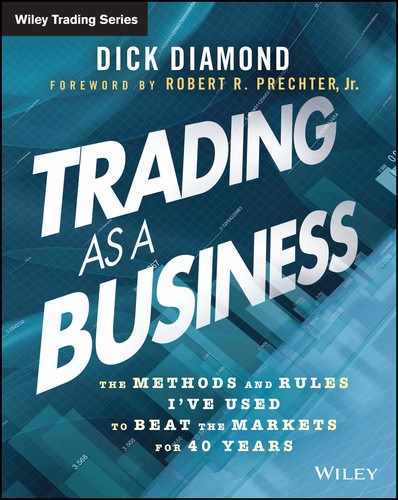Foreword
In 1979, I was sitting between two traders at a specialty brokerage firm. The one on my left was on the phone all day, working his contacts to get preopening shares in initial public offerings, which he would jettison at a profit shortly after the deals. He solicited opinions from friends to figure out hot stocks to ride. He was always long, never short. The guy on my right was a plunger who would identify markets that were extended and then bet huge wads on a reversal. I was there when a reversal didn't come, and he was gone.
Sitting across the room was a loner who quietly worked his system. The friend to my left suggested I meet him, so I did. I asked him what he was doing. He said he traded options, and I could sit and watch if I wanted. His name was Dick Diamond.
Most of the traders in the room were chatty, but Dick was quiet. Mostly, he just watched the screen and updated his indicators. Then every now and then he would sit up straight and become hyperalert. Then—bam—he would call in a trade. (There were no electronic trading platforms back then.) He would stay on edge for a period of time, maybe an hour, and then call to close the trade. Then he relaxed again.
When I pressed him about what he was doing, he would talk about waiting for the right “setups,” acting swiftly and getting out while momentum was still in his favor, an absolute must when trading options. He seemed more disciplined than other traders. He wasn't trying to win a war; he was in a bunker, taking the occasional shot when his odds of a hit were 80/20. He never changed his tactics, never asked other people their opinions, and never bet big. Incredibly, unlike almost everyone else, he was also making a very good living, every single month.
I liked Dick right away because he was a pure technician. He never acted on news; he didn't care about valuation; he didn't try to solicit inside information; he didn't factor in what the economy was doing, or the president, or the Fed. He just waited for the market to signal the start of a volatile move; then he grabbed a piece of it, time and again. We struck up a friendship that's still ongoing.
In the mid-1980s, Dick and I talked about teaching his method. Subscribers were always asking me about where they could learn trading, and he was ready to show a few people how he did it. So for several years, he taught would-be traders, usually about four at a time, in his Long Island home. They would sit with him for a week as he showed them exactly what he did all day. Despite being shown the ropes, most students, for psychological and other reasons, never became as successful as he is. But every now and then he would report on one who “got it” and was doing well.
In the 2000s, after Dick moved to Florida, he set up seminars that would accommodate 20 or more people. Dick was trading futures by then, but he never changed his entry and exit methods. He and his partners, Roberto Hernandez and Brad Marcus, kept to the format of allowing prospective traders to learn what he was doing, in real time, for a week. Often, he would get dumb questions such as, “When you get stopped out, why don't you just reverse your position?” Dick's usual answer was, “That's not what I do.” Secretly, he was thinking, “If you want to lose money on some random idea, go ahead.” But, occasionally, an attendee would adopt his method and start winning more than losing.
In the 1990s, I started bugging Dick about writing a book. I said, “Lots of trading books are about making killings and getting killed. Yours will be about chopping it out every day, not for a thrill but as a business. It will be a first.” His wife took up the cause.
Many years went by, and no book. Dick is not a writer; he's a trader. After a false start or two, my firm put Dick together with seasoned editor Kevin Commins, with whom we had worked on several projects. Soon the trading book began to take shape.
And here it is!
If you're looking for colorful “war stories,” you won't get any. But if you read this book, you will know—as closely as you can absent mathematical codification—just what Dick has been doing all these years.
Dick's approach is so conservative that he's still trading at an age when most people are retired. And he still doesn't have a boss or employees. For most people, trading produces sleepless nights. For him, it produces steady income at retirement age. What a difference! Incredibly, this is absolutely not what most traders want. Consciously or unconsciously, they want big scores. That's one reason they end up losing.
Anybody can adopt Dick's method. Whether you do is another question. But it's all here, and it's very clear.
ROBERT PRECHTER
September 2014
